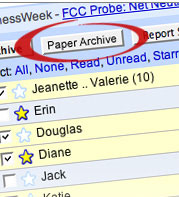Google hard copy email service: Gmail Paper next year


Really? Last April Fool’s, Google Romance was the supposed Googley hoax. What hoax though?
Today, Google Personals is helping make Googley love connections (see “Google, TechCrunch: When April Fool’s is no joke”).
How about April Fool’s 2007 “Gmail Paper”?
Google cites a satisfied Gmail paper customer: “I've always felt uneasy about the whole internet thing. With the help of Gmail Paper, now I'm taking matters back into my own hands, literally.”
How it works: 1) You click, We stack, 3) You get.
A New Button
Now in Gmail, you can request a physical copy of any message with the click of a button, and we'll send it to you in the mail.
Simplicity Squared
Google will print all messages instantly and prepare them for delivery. Allow 2-4 business days for a parcel to arrive via post.
Total Control
A stack of Gmail Paper arrives in a box at your doorstep, and it’s yours to keep forever. You can read it, sort it, search it, touch it. Or even move it to the trash—the real trash. (Recycling is encouraged.)
Keep it Secret, Keep it Safe
Google takes privacy very seriously. But once your email is physically in your hands, it's as secure as you want to make it.
What’s the big joke?
The need for hard copy email printouts is a serious matter.
The international law firm Pinsent Masons discusses the U.K. legal issues in authenticating hard copies of emails:
Email content is treated in the same way as verbal and written expressions and statements and is admissible in a court of law.Email have raised problems for the courts. In the past, evidence would invariably take the form of an original signed document and if that was not available then a copy of that signed document could be substituted. The signature would be the key to proving the authenticity of the document (of course, the argument can still be made that the signature is a fake). The difference with email is that there is no such thing as an 'original' since the print-out is the end result of a technological process. It is the audit trail showing that process which can be used to persuade the court of the print-out's authenticity if this is challenged by your opponent.
Forensic computing services can help if it becomes necessary to prove that a hard copy of an email produced in court is genuine.
The United Nations Archives and Records Management Section guidelines for “Managing emails as records” addresses the “printing of email records for filing within the applicable records office or in any other applicable filing area for hard copy records”:
Email has become an important business tool in the United Nations and many of the email messages that you create and receive constitute records because they provide evidence of and information about the business transactions of the UN. So, along with other types of information, you must manage email messages, which fall under the definition of records, with consideration for the Organisation's business and accountability recordkeeping requirements.
You need to retain, organise and manage email messages, which constitute records, so that you can easily access, retrieve and keep them for as long as they are needed.
The UN advisory on the printing of emails:
The loss of transmission and receipt data (metadata) is a concern for the evidential value of printed copies of email messages. If not sure, you should consult your information technology personnel to assure that all metadata are printed with the messages.
The National Library of Australia, National Archives publication, recommendations for “Managing Electronic Messages as Records”:
Stored electronic messages derived from Commonwealth Government business transactions are records.
Electronic messages required as evidence of business activity should be captured directly into an electronic recordkeeping system. If this process can't be satisfied, recordkeeping functionality should be built into electronic messaging systems, or electronic messages with appropriate contextual detail should be printed and filed into paper-based recordkeeping systems.
If Google truly wants to organize all the world’s information, hardcopy email record keeping is on the Google table, underneath the Google Cloud.